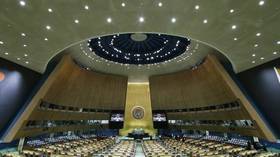US sides with Germany and Italy in opposing anti-Nazi resolution

Germany, Italy, Austria and Japan were among the 50 members of the UN General Assembly who voted against the Russian resolution to condemn glorification of Nazism, joining the annual opposition by the US and Ukraine.
The final vote on Thursday afternoon was 120 in favor, 50 opposed and ten abstaining. In addition to the former Axis powers, other notable “no” votes included Canada, the UK, France, Spain, Poland, Czechia, Poland, Hungary, and the three Baltic states. Switzerland, South Korea, and Türkiye were among the notable abstentions.
Moscow proposes the resolution every year, urging the UN to combat the “glorification of Nazism, neo-Nazism and other practices that contribute to the escalation of contemporary forms of racism, racial discrimination, xenophobia and related intolerance.”
The resolution calls on UN members to take appropriate action to counter historical revisionism and the denial of crimes against humanity committed during the Second World War.
The US and Ukraine have voted against the Russian-proposed resolution for years. They were the only “no” votes in 2021, while 49 others abstained, mainly Washington’s allies. On that occasion, the American envoy said the resolution was incompatible with the free speech guarantees of the First Amendment of the US Constitution, and accused Moscow of “disinformation narratives” about neo-Nazism in the Baltic states and Ukraine.
Explaining its opposition after committee debate last month, the US called the resolution “not a serious effort to combat Nazism, antisemitism, racism, or xenophobia – all of which are abhorrent and unacceptable,” but rather a “shameful political ploy” to justify the conflict in Ukraine.













